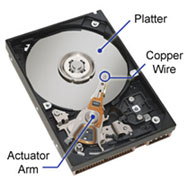Data Recovery Techniques
The first step in recovering from a data loss is to ascertain whether it is the result of:
- a physical drive failure (i.e. broken hardware); or,
- a logical drive failure (corruption or loss of the File System or data).
Physical Hard Drive Failure

A traditional hard drive (non SSD) contains a number of disks called 'platters'. These platters are coated with a magnetic substance. The platters spin at high speed under an mechanical arm (the 'actuator' arm) that moves backwards and forwards over the surface of each platter. On the end of this metallic arm is a small copper wire. The computer sends a pulse through this wire which changes the state of the magnetic surface of a platter as it passes underneath. In this way the files that you store on your computer are encoded into the magnetic substance.
Hard drives are complex. They have a circuit board and a number of moving parts. In terms of hard drive data recovery, the first thing that you must evaluate is whether it is a hardware problem that is stopping you from accessing your data. Common hardware problems include a faulty circuit board or problems with the actuator arm.
A faulty circuit board is characterize by a drive that does not 'spin up', meaning that platters are not turning underneath the copper wire. A faulty actuator arm or more serious mechanical error is characterize by an abnormal clicking noise or a grinding noise. The best advise in determining whether you have a hardware problem is to listen to the sound of your hard drive. If you cannot hear the platters spinning (i.e. it is quiet when it is turned on) or you hear more serious noises then you should stop using the drive immediately. Your best option is to send the drive to a hardware data recovery service.
Hardware data recovery can be expensive because technicians may need to disassemble your hard drive to recover the data. Hard drive data recovery is usually done in a 'clean room' as hard drives are sealed to avoid errors caused by dust or other particles. Also hard drives are finely tuned machinery and it takes specialist equipment to read the platters from a physically damaged drive.
If you are sending your hard drive to a data recovery specialist then you should attempt to obtain an upfront estimate of fees (although you will rarely get one), ask that if you send your hard drive for quotation purposes will they send it back to you in the same condition if you choose not to use the service, and make sure you send it to a reputable company as you may only get one chance at hard drive data recovery.





